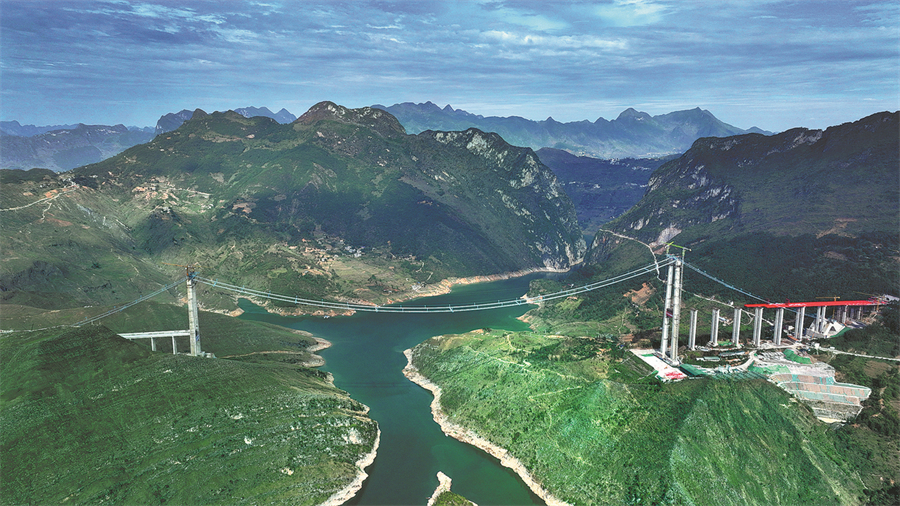Bridge construction projects span valleys, change lives

An aerial photo shows the 1,849-meter-long Zangke River Bridge, which is under construction in the Wumengshan National Geological Park in Guizhou.
The structures will boost connectivity, improve the local economy and raise people's living standards. Luo Wangshu reports from Liupanshui, Guizhou.
From their workplace, Tang Qiguo and his two colleagues enjoy breathtaking views that probably beat those seen from 99 percent of office penthouses anywhere in the world.
The three men work with the clouds below their feet and fog at their fingertips. Looking down, they can see a river flowing through a valley, encompassed by mountains.
They are construction workers on the Zangke River Bridge, one of the most important projects along a new freeway set to link Nayong and Qinglong in the southwestern province of Guizhou.
The structure is like a massive swing hanging between the mountains, high above the river. Tang, 21, and his peers affix cables at a height of some 200 meters, the equivalent of about an 88-story building.
To do this, they use two special walkways that run about 1 kilometer on either side. The walkways, made from wooden planks and metal grids, are fenced in for safety reasons.
Although both the engineers and construction workers say the walkways are quite safe, people have to be able to conquer their fear of heights to walk on them.
However, that isn't a problem for Tang or his colleagues, who traverse the walkways as easily as if they were walking along a street — albeit one more than 200 meters above the ground.
Construction is expected to be completed in August next year. Once finished, the bridge will slash the journey across the valley from one hour to about 60 seconds, greatly benefiting the residents of the mountainous area.
The project reflects the ambitions for the development of transportation in Guizhou, a mountainous province with little flat land. Those geographical difficulties have long hampered development, and Guizhou was once one of China's poorest provinces.
Compared with the plains, building a transportation network through Guizhou's mountains requires advanced technological solutions, while construction costs are far higher because many tunnels and bridges are required.
According to the provincial transportation commission, there are nearly 30,000 bridges dotted along the region's 210,000-km road network, 8,331 km of which consists of freeways.
In 1949, when the People's Republic of China was founded, there were just 357 bridges in Guizhou.
The new bridges are not only links to facilitate social and economic development, they are also "calling cards" that demonstrate the country's accomplishments within the sphere of the transportation infrastructure.
























